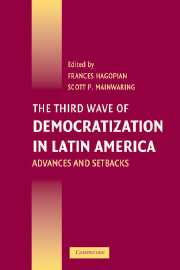Book contents
- Frontmatter
- Contents
- List of Figures
- List of Tables
- List of contributors
- Acknowledgments
- Introduction: The Third Wave of Democratization in Latin America
- 1 Latin American Democratization since 1978: Democratic Transitions, Breakdowns, and Erosions
- PART I THREE DEMOCRATIC GIANTS WITH AUTHORITARIAN PASTS: ARGENTINA, BRAZIL, AND MEXICO
- PART II UNEXPECTED DEMOCRACIES IN UNLIKELY COUNTRIES: BOLIVIA, EL SALVADOR, AND GUATEMALA
- PART III DEMOCRATIC EROSIONS IN THE THIRD WAVE: COLOMBIA, PERU, AND VENEZUELA
- PART IV Conclusions
- 11 Conclusions: Government Performance, Political Representation, and Public Perceptions of Contemporary Democracy in Latin America
- References
- Index
11 - Conclusions: Government Performance, Political Representation, and Public Perceptions of Contemporary Democracy in Latin America
Published online by Cambridge University Press: 05 September 2012
- Frontmatter
- Contents
- List of Figures
- List of Tables
- List of contributors
- Acknowledgments
- Introduction: The Third Wave of Democratization in Latin America
- 1 Latin American Democratization since 1978: Democratic Transitions, Breakdowns, and Erosions
- PART I THREE DEMOCRATIC GIANTS WITH AUTHORITARIAN PASTS: ARGENTINA, BRAZIL, AND MEXICO
- PART II UNEXPECTED DEMOCRACIES IN UNLIKELY COUNTRIES: BOLIVIA, EL SALVADOR, AND GUATEMALA
- PART III DEMOCRATIC EROSIONS IN THE THIRD WAVE: COLOMBIA, PERU, AND VENEZUELA
- PART IV Conclusions
- 11 Conclusions: Government Performance, Political Representation, and Public Perceptions of Contemporary Democracy in Latin America
- References
- Index
Summary
A quarter century after the Third Wave of democratization began in Latin America, democratic regimes have never been as prevalent or even as secure in Latin America. There have been no reversals of democracy to speak of in the past quarter century – only in Peru in 1992 was there a partial exception to democratic rule, and only in Cuba today is an authoritarian leader so firmly entrenched that uncertainty remains about the way to effect a democratic transition. In most of the continent, that transition took place so long ago that an entire generation cannot remember living at a time when they could not vote for their leaders.
Yet, all is not well. Public support and enthusiasm for democracy is as weak as it has perhaps ever been. When asked specifically whether or not they prefer democracy to any other form of government, Latin Americans manifest high rates of ambivalence. Latinobarómetro data – published annually in The Economist magazine – shows that Latin America is replete with “doubting democrats.” On average, in 2003 only slightly more than half of Latin Americans agreed with the statement that “democracy is preferable to any other kind of government” (The Economist 2003: 33), and 52 percent of respondents across the region agreed that they would “not mind a non-democratic government in power if it could solve the economic problems” (Latinobarómetro 2003: 12). Only in Honduras, Venezuela, and Mexico has public support for democracy not eroded in the past seven years (see Table 1.11).
- Type
- Chapter
- Information
- The Third Wave of Democratization in Latin AmericaAdvances and Setbacks, pp. 319 - 362Publisher: Cambridge University PressPrint publication year: 2005
- 17
- Cited by



